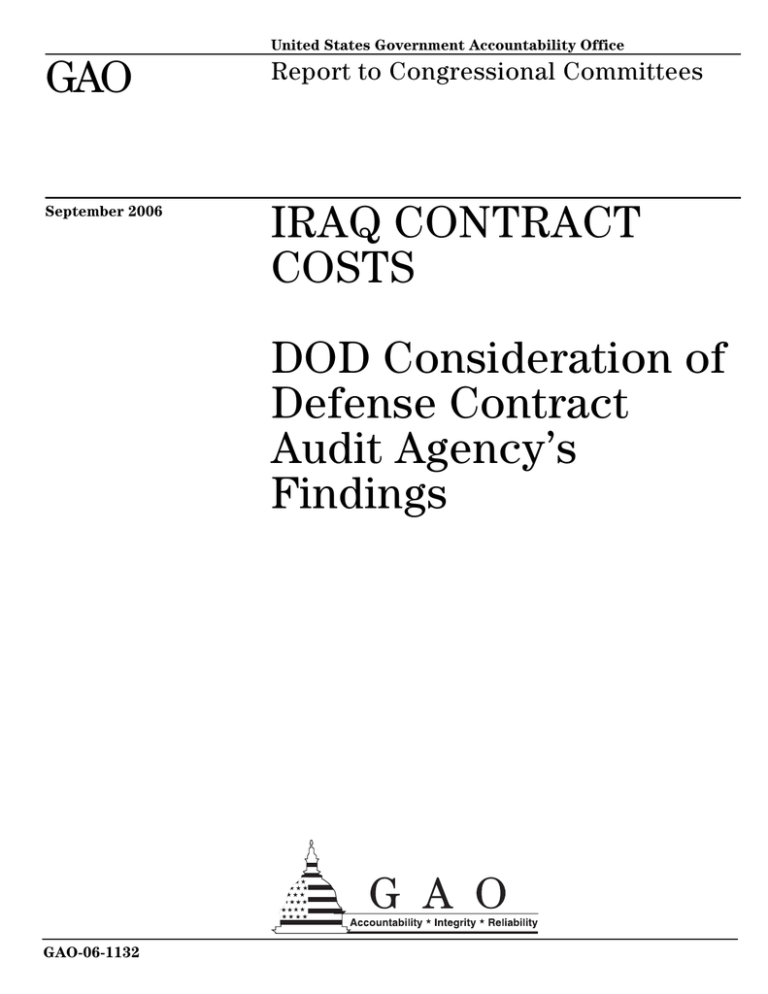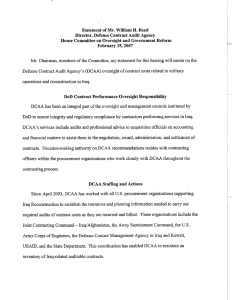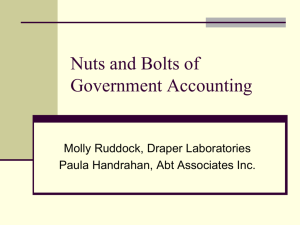GAO IRAQ CONTRACT COSTS DOD Consideration of
advertisement

United States Government Accountability Office GAO Report to Congressional Committees September 2006 IRAQ CONTRACT COSTS DOD Consideration of Defense Contract Audit Agency’s Findings GAO-06-1132 September 2006 IRAQ CONTRACT COSTS Accountability Integrity Reliability Highlights Highlights of GAO-06-1132, a report to Congressional Committees DOD Consideration of Defense Contract Audit Agency's Findings Why GAO Did This Study What GAO Found The government has hired private contractors to provide billions of dollars worth of goods and services to support U.S. efforts in Iraq. Faced with the uncertainty as to the full extent of rebuilding Iraq, the government authorized contractors to begin work before key terms and conditions were defined. This approach allows the government to initiate needed work quickly, but can result in additional costs and risks being imposed on the government. Helping to oversee their work is the Defense Contract Audit Agency (DCAA), which examined many Iraq contracts and identified costs they consider to be questioned or unsupported. Defense Contract Audit Agency audit reports issued between February 2003 and February 2006 identified $2.1 billion in questioned costs and $1.4 billion in unsupported costs on Iraq contracts. DCAA defines questioned costs as costs that are unacceptable for negotiating reasonable contract prices, and unsupported costs as costs for which the contractor has not provided sufficient documentation. This information is provided to DOD for its negotiations with contractors. Based on information provided by DCAA, DOD contracting officials have taken actions to address $1.4 billion in questioned costs. As a result, DOD contracting officials negotiated contract cost reductions of $386 million according to DCAA. Based on the information provided by DCAA, as of July 2006, the remaining $700 million in questioned costs is still in process. Because unsupported costs indicate a lack of contractor information that is needed to assess costs, DCAA cannot and does not render an opinion on those costs. Therefore, DCAA does not track the resolution of unsupported costs. The Conference Report on the National Defense Authorization Act for Fiscal Year 2006 directed GAO to report on audit findings regarding contracts in Iraq and Afghanistan. As agreed with the congressional defense committees, GAO focused on Iraq contract audit findings and determined (1) the costs identified by DCAA as questioned or unsupported; and (2) what actions DOD has taken to address DCAA audit findings, including the extent funds were withheld from contractors. To identify DOD actions in response to the audit findings, GAO selected 18 audit reports representing about 50 percent of DCAA’s questioned and unsupported costs on Iraq contracts. GAO requested comments from DOD on a draft of this report, but none were provided. For the 18 audit reports selected for this review, GAO found that DOD contracting officials took a variety of actions to address DCAA’s audit findings, including not allowing some contractor costs. In the contract documentation GAO reviewed, DOD contracting officials generally considered DCAA’s questioned and unsupported cost findings when negotiating with the contractor. GAO found DOD contracting officials were more likely to use DCAA’s advice when negotiations were timely and occurred before contractors had incurred substantial costs. For example, in three audit reports related to a logistics support task order negotiated prior to the onset of work, DCAA questioned $204 million. According to DCAA’s calculations, $120 million of these questioned costs was removed from the contractor’s proposal as a result of its audit findings. In contrast, DOD officials were less likely to remove questioned costs from a contract proposal when the contractor had already incurred these costs. For example, in five audit reports comprising about $600 million of questioned costs reviewed, GAO found that the DOD contracting officials determined that the contractor should be paid for all but $38 million of the questioned costs, but reduced the base used to calculate the contractor’s fee by $205 million. By reducing the base, the DOD contracting official reduced the contractor’s fee by approximately $6 million. In addition to identifying questioned and unsupported costs, DCAA has the option of withholding funds from the contractor and chose to withhold a total of $236 million for eight cases included in this review. www.gao.gov/cgi-bin/getrpt?GAO-06-1132. To view the full product, including the scope and methodology, click on the link above. For more information, contact John Hutton at (202) 512-4841 or huttonj@gao.gov. United States Government Accountability Office Contents Letter 1 Results In Brief Background DCAA Audit Reports Identified Billions of Dollars of Questioned and Unsupported Costs on Iraq Contracts DOD Contracting Officials Have Taken a Range of Actions to Address Audit Findings Appendix I Scope and Methodology 2 4 5 6 15 Figures Figure 1: Timeline of Key Contracting Events for Restore Iraqi Oil Contract, Task Order 5 Figure 2: Timeline of Key Contracting Events for Logistics Civil Augmentation Program III Contract, Task Order 89 9 10 Abbreviations: DCAA DESC DOD FAR Defense Contract Audit Agency Defense Energy Support Center Department of Defense Federal Acquisition Regulation This is a work of the U.S. government and is not subject to copyright protection in the United States. It may be reproduced and distributed in its entirety without further permission from GAO. However, because this work may contain copyrighted images or other material, permission from the copyright holder may be necessary if you wish to reproduce this material separately. Page i GAO-06-1132 Iraq Contract Costs United States Government Accountability Office Washington, DC 20548 September 25, 2006 Congressional Committees The United States is spending billions of dollars to achieve U.S. political, security, and economic goals in Iraq. Between fiscal years 2003 and 2006, the U.S. government has allocated about $311 billion to support U.S. stabilization and reconstruction efforts in Iraq. The United States has relied heavily on private-sector contractors to provide the goods and services needed to support both the military and reconstruction efforts in Iraq. Faced with the uncertainty as to the full extent of rebuilding Iraq, the government authorized contractors to begin work before key terms and conditions were defined. This approach allows the government to initiate needed work quickly, but can result in additional costs and risks being imposed on the government. Given the dollar amounts involved, it is essential that these acquisitions be handled in an efficient, effective, and accountable manner to mitigate the government’s risk. The Defense Contract Audit Agency (DCAA) provides services that can help DOD ensure accountability for its acquisitions. DCAA performs audits and provides financial advisory services in connection with negotiation, administration, and settlement of contracts and subcontracts. For example, DCAA has audited many Iraq contract proposals and contracts and has identified costs it considers to be questioned or unsupported. DCAA defines questioned costs as those costs considered to be not acceptable for negotiating a reasonable contract price, and unsupported costs as costs for which the contractor has not furnished sufficient documentation to support the cost proposed or claimed. The Conference Report on the National Defense Authorization Act for Fiscal Year 20061 directed GAO to report on audit findings regarding contracts in Iraq and Afghanistan. As agreed with the congressional defense committees, we focused on Iraq contract audit findings and determined (1) the costs identified by DCAA as questioned or unsupported; and (2) what actions DOD has taken to address DCAA audit 1 National Defense Authorization Act of 2006, H.R. Conf. Rep. No. 109-360, p. 767(Dec. 18, 2005). Page 1 GAO-06-1132 Iraq Contract ontract Costs findings, including the extent to which funds were withheld from contractors. To determine the costs DCAA questioned or identified as unsupported, we analyzed information provided to us by DCAA on Iraq-related audit reports issued between February 2003 and February 2006. To identify actions taken by DOD to address audit findings and funds withheld, we selected 18 audit reports comprised of (1) the 10 reports with the highest dollar amounts of questioned and unsupported costs, and (2) 8 other audit reports with questioned and unsupported costs above $5 million. The questioned and unsupported costs for the 18 selected reports totaled $1.8 billion, or approximately 50 percent of all questioned and unsupported costs identified through DCAA’s data on Iraq contracts. The selected audit reports represent work performed by four contractors. For each audit report, we obtained key documentation from DCAA and DOD, and interviewed DCAA auditors and DOD contracting officials. Appendix I provides details on our scope and methodology. We conducted our work from March 2006 through September 2006 in accordance with generally accepted government auditing standards. Results In Brief Between February 2003 and February 2006, DCAA issued hundreds of audit reports that collectively identified $2.1 billion in questioned costs and $1.4 billion in unsupported costs on Iraq contracts, primarily through audits of contractor proposals. Based on information provided to us by DCAA, contracting officials had addressed $1.4 billion of DCAA’s questioned costs. Of that amount, contracting officials reduced contract costs by about $386 million, according to information provided by DCAA.2 Based on the information provided by DCAA, as of July 2006, the remaining $700 million in questioned costs is still in process. Because unsupported costs indicate a lack of contractor information that is needed to assess costs, DCAA cannot and does not render an opinion on those costs. Therefore, DCAA does not track the resolution of unsupported costs. 2 DCAA provided information that identified $453 million in reduced contract costs. Based on our review of 18 audit reports, we found DCAA’s information on reduced contract costs included $67 million that was paid to the contractor but removed from the base used to calculate the contractor’s fees. DCAA officials acknowledged these costs should not be included and that the $453 million does not represent a total reduction in contract costs. Page 2 GAO-06-1132 Iraq Contract Costs For the 18 audit reports selected for this review, we found that DOD contracting officials took a variety of actions in response to DCAA’s audit findings, including not allowing some contractor costs. Based on contract documentation we reviewed, the DOD contracting officials generally considered DCAA’s questioned and unsupported cost findings when negotiating with the contractor. We found that DOD contracting officials were more likely to use DCAA’s advice when negotiations were timely and occurred before contractors had incurred substantial costs. For example, in 3 audit reports related to a logistics support task order negotiated prior to the onset of work, DCAA questioned $204 million. According to DCAA’s calculations, $120 million of these questioned costs was removed from the contractor’s proposal as a result of its audit findings. In contrast, DOD officials were less likely to remove questioned costs from a contract proposal when the contractor had already incurred these costs. Of the 18 audits covered in our review, 11 audit reports corresponded to contract actions where more than 180 days had elapsed from the beginning of the period of performance to final negotiations. For example, in 5 audit reports comprising about $600 million of questioned costs reviewed, we found that the DOD contracting officials determined that the contractor should be paid for all but $38 million of the questioned costs, but reduced the base used to calculate the contractor’s fee by $205 million. By reducing the base, the DOD contracting official reduced the contractor’s fee by approximately $6 million. In addition to identifying questioned and unsupported costs, DCAA can withhold funds from contractor payments,3 and chose to withhold a total of $236 million for 8 cases included in our review. Of the $236 million, the government decided to pay the contractors $148 million, not to pay $36 million, and $51 million has not been settled yet.4 We requested comments from DOD on a draft of this report, but none were provided. 3 Pursuant to the authority of DOD Directive 5105.36, DCAA can issue a Form 1. A Form 1 constitutes notice of costs suspended and/or disapproved incident to the audit of contractor costs incurred under a contract. Suspended costs are costs that have been determined to be inadequately supported or otherwise questionable, and not appropriate for reimbursement under contract terms at this time. Such costs may be determined reimbursable after the contractor provides the auditor additional documentation or explanation. Disapproved costs have been determined to be unallowable, that is, not reimbursable under the contract terms. 4 Monies withheld do not add to $236 million due to rounding. Page 3 GAO-06-1132 Iraq Contract Costs Background The United States, along with its coalition partners and various international organizations and donors, has embarked on a significant effort to rebuild Iraq. The United States is spending billions of dollars to reconstruct Iraq while combating an insurgency that has targeted military and contractor personnel and the Iraqi people. The United States has relied heavily on private-sector contractors to provide the goods and services needed to support both the military and reconstruction efforts in Iraq. DCAA is responsible for providing contract audits for DOD, along with general accounting and financial advice to DOD acquisition officials negotiating government contracts. DCAA performs many types of audits for DOD, including audits of contractor proposals, audits of estimating and accounting systems, and incurred cost audits. Generally, the results of a DCAA audit are intended to assist contracting officials in negotiating reasonable contract prices. Normally, DCAA audits contractors’ proposals and provides contracting officials advice on the reasonableness of contractor costs prior to negotiations. DCAA also conducts audits of costtype contracts after they are negotiated to ensure costs incurred on these contracts are acceptable. Relying on cost information provided by the contractor and assessing whether the costs comply with government regulations, DCAA may identify certain costs as questioned or unsupported. DCAA defines questioned costs as costs considered to be not acceptable for negotiating a reasonable contract price, and unsupported costs as costs that lack sufficient supporting documentation. DCAA reports its findings to contracting officers for consideration in negotiating reasonable contract prices. DCAA audit reports represent one way DCAA can assist contracting officials as they negotiate government contracts. Also, contracting officials may invite DCAA to participate in contract negotiations to explain audit findings and recommendations, and may factor DCAA audit findings into evaluations of contract proposals. The Federal Acquisition Regulation (FAR) acknowledges that DCAA’s role is advisory, and assigns the contracting officer responsibility for ensuring that the contractor’s proposed price is fair and reasonable.5 While DCAA audit recommendations are nonbinding, DCAA’s Contract Audit Manual states 5 Federal Acquisition Regulation (FAR) 1.602-2(c), Responsibilities, 15.402(a) Pricing Policy (January 2006). Page 4 GAO-06-1132 Iraq Contract Costs that contracting officials deviating from DCAA advice during negotiations should explain the reasons why they disagreed with DCAA. DOD Directive 5105.36 also enables DCAA to withhold payments by (1) suspending payment for specific incurred costs lacking documentation or (2) disapproving costs that do not conform with applicable regulations. DCAA can issue a Form 1 to a contractor notifying it that funds will be withheld, which initiates review of the challenged costs by the contracting officer. DCAA Audit Reports Identified Billions of Dollars of Questioned and Unsupported Costs on Iraq Contracts Between February 2003 and February 2006, DCAA issued hundreds of audit reports that collectively identified $3.5 billion in questioned and unsupported costs on Iraq-related contracts, primarily through audits of contractor proposals. In some cases, DCAA was asked to audit multiple iterations of contractor proposals as these proposals were revised over a period of time. Based on information provided by DCAA, contracting officials have responded to audit findings that questioned $1.4 billion. As a result, contracting officials negotiated contract cost reductions of $386 million according to DCAA. DCAA does not render an opinion about costs it determines to be unsupported; therefore they do not track the resolution of unsupported costs. DCAA Identified Billions of Dollars in Questioned and Unsupported Costs Between February 2003 and February 2006, DCAA tracked 349 audit reports that identified about $3.5 billion in questioned and unsupported costs on Iraq contracts. Of this total, DCAA classified $2.1 billion as questioned, and $1.4 billion as unsupported. DCAA identified these questioned and unsupported costs in audits related to 99 different contractors. Most of the questioned and unsupported costs were identified through audits of contractor proposals. Specifically, in DCAA’s database, more than three-quarters of the audits with questioned and unsupported costs were classified as “forward pricing activity,” which primarily involves auditing contractor proposals or parts of proposals. In some cases, DCAA reviewed multiple contractor proposals for the same work. DOD officials told us that contractors submitted multiple proposals because requirements changed or the proposal was considered inadequate for negotiations. For example, over a 6-month period, DCAA issued four audit reports on three different proposals for a task order related to an oil mission. Each audit superseded the prior one, and DCAA updates its information to reflect the most recent report. Page 5 GAO-06-1132 Iraq Contract Costs DCAA Tracks How Questioned Costs Are Addressed but Does Not Track Similar Information for Unsupported Costs While DCAA tracks and records how questioned costs are addressed by the contracting official in negotiation, it does not track similar information about unsupported costs. Based on the data provided to us by DCAA, as of July 3, 2006, contracting officials had responded to 169 of DCAA’s 349 Iraq audit reports. DCAA considered the findings to be addressed because the contracting official had documented the result of negotiations with the contractor. Based on information provided by DCAA, for the $1.4 billion in questioned costs addressed by contracting officials, contracting officials sustained $386 million of the total questioned costs. DCAA defines sustained costs as the costs reduced through negotiations directly attributable to findings reported by the DCAA auditor for proposal audits. Based on the information provided by DCAA, as of July 2006, the remaining $700 million in questioned costs is still in process. DCAA’s information does not reflect what actions, if any, the contracting officials have taken to respond to these audit report findings. According to a DCAA official, DCAA does not track how unsupported costs are addressed. DCAA guidance implementing the FAR requires the contracting official to report on the disposition of questioned amounts, but not specifically on whether contractors provided sufficient documentation to eliminate unsupported costs.6 Because unsupported costs indicate a lack of contractor information that is needed to assess costs, DCAA cannot and does not render an opinion on those costs. Therefore, DCAA does not track the resolution of unsupported costs. DOD Contracting Officials Have Taken a Range of Actions to Address Audit Findings For the 18 audit reports selected for this review, we found that DOD took a variety of actions in response to audit findings, including not allowing some contractor costs. Based on contract documentation we reviewed, the DOD contracting officials generally considered DCAA’s questioned and unsupported cost findings when negotiating with the contractor. We found that DOD contracting officials were more likely to use DCAA’s advice when negotiations were timely and occurred before contractors had incurred substantial costs. In contrast, DOD officials were less likely to remove questioned costs from a contract proposal when the contractor 6 The FAR states when the contracting officer elects not to adopt significant audit or other specialist recommendations, the contracting officer should provide a rationale which supports the negotiation result in the price negotiation documentation. Federal Acquisition Regulation (FAR) 15.405(a), Price Negotiation (January 2006). Page 6 GAO-06-1132 Iraq Contract Costs had already incurred these costs. In addition to identifying questioned and unsupported costs, DCAA can also withhold funds from the contractor, which it chose to do in eight of the cases included in our review. Other actions taken by the DOD contracting officials included inviting DCAA to attend meetings or negotiations with the contractor and conducting additional analyses to respond to audit findings. DOD Generally Considered DCAA Audit Findings When Negotiating with the Contractor Our review of the government’s documentation of contract negotiations for the selected audit reports showed that DOD generally considered DCAA audit findings.7 The majority, or 13 of the 15 memorandums, identified how the contracting officials addressed DCAA audit findings.8 Most memorandums discussed questioned and unsupported costs identified by DCAA in areas such as labor, equipment, material, and subcontracts, but some lacked specific detail on how DCAA audit findings were addressed. However, in two cases we were unable to determine from the negotiation documentation how DCAA audit findings were used. DOD Contracting Officials Less Likely to Remove Questioned Costs Already Incurred by the Contractor To address the more than $1 billion in questioned costs related to the audits selected, we found that the DOD contracting officials were less likely to remove questioned costs from a contractor proposal when the contractor had already incurred these costs. For example, in 5 audit reports comprising about $600 million of questioned costs reviewed, we found that the DOD contracting officials determined that the contractor should be paid for nearly all of the questioned costs (all but $38 million), but reduced the base used to calculate the contractor’s fee (by $205 million). By reducing the base, the DOD contracting official reduced the contractor’s fee by approximately $6 million. Generally, when entering into a contract, the government and contractor reach agreement on the key aspects of the contract, including the scope and price of the work, before the work is authorized to start. However, the FAR enables the government to authorize the contractor to begin work before doing so in certain cases, such as when the government demands 7 Documentation of contract negotiations includes price negotiation memorandums, business clearance memorandums, and definitization memorandums. For purposes of this report, we will refer to these documents collectively as “memorandums.” 8 There were 15 memorandums related to the selected audit reports included in our review. Two of the memorandums addressed multiple audit reports. Page 7 GAO-06-1132 Iraq Contract Costs the work start immediately and it is not possible to negotiate a fully defined contract in sufficient time to meet the requirement.9 Our past work has shown that the use of undefinitized contract actions can pose risks to the government, such as potentially significant additional costs.10 Acquisition regulations generally require that the contracting official define the scope and costs of such contracts within 180 days of the contract’s start date. According to contract officials, urgent conditions in Iraq led the government to initiate such contract actions without first specifying their scope of work and agreeing to the contract price. In many cases we reviewed, contractors completed some work and incurred substantial costs well before the government negotiated the contract price. Of the 18 audits covered in our review, 11 audit reports corresponded to contract actions where more than 180 days had elapsed from the beginning of the period of performance to final negotiations. For nine of these audits, the period of performance DOD initially authorized for each contract action concluded before final negotiations took place. For example, DCAA questioned $84 million in its audit of a task order proposal for an oil mission. In this case, the contractor did not submit a proposal until a year after the work was authorized, and DOD and the contractor did not negotiate the final terms of the task order until more than a year after the contractor had completed work (see fig. 1). The DOD contracting officer paid the contractor for all questioned costs but reduced the base used to calculate contractor profit by $45 million. As a result, the contractor was paid about $3 million less in fees. In the final negotiation documentation, the DOD contracting official stated that payment of incurred costs is required for cost-type contracts, absent unusual circumstances.11 This same rationale was used in negotiations on several other task orders. 9 FAR 16.603 Letter Contracts (January 2006). 10 GAO, Rebuilding Iraq: Fiscal Year 2003 Contract Award Procedures and Management Challenges, GAO-04-605 (Washington, D.C.: June 1, 2004). 11 The DOD contracting official indicates that because DCAA chose not to suspend or disallow the funds, DCAA and DOD agree that these unusual circumstances did not exist. However, DCAA officials do not agree with this characterization. Page 8 GAO-06-1132 Iraq Contract Costs Figure 1: Timeline of Key Contracting Events for Restore Iraqi Oil Contract, Task Order 5 Period of performance: May 4, 2003–December 24, 2003 Revised contract proposal Jan. 21 DCAA Audit report Jan. 11 DCAA Audit report Feb. 25 DCAA Audit report Oct 8 J F 2003 M A M J J Revised contract proposal Nov. 23 Contract proposal May 5 Notice to proceed May 4 A S O N D J F M A M J DCAA Audit report Apr. 16 J 2004 A S O N D J Negotiations Jul. 29 F M A M J J A Price negotiation memo Sept. 9 S O N D J 2005 Source: GAO analysis of DOD data. In contrast, in the few audit reports we reviewed where the government negotiated prior to starting work, we found that the portion of questioned costs removed from the proposal was substantial. For example, in 3 audit reports related to a logistics support task order, DCAA questioned $204 million. Since the government and the contractor negotiated the terms of this task order prior to the onset of work, the contractor had not incurred any costs at the time of negotiation (see fig. 2 for timeline). According to DCAA’s calculations, $120 million of these questioned costs was removed from the contractor’s proposal as a result of its audit findings. Page 9 GAO-06-1132 Iraq Contract Costs Figure 2: Timeline of Key Contracting Events for Logistics Civil Augmentation Program III Contract, Task Order 89 Period of performance: May 1, 2005–April 30, 2006 DCAA Audit report Apr. 12 Contract proposal Mar. 29 J F M A Negotiations concluded/ price negotiation memo Apr. 17 M J J A S O 2005 N D J F M A M J J 2006 Source: GAO analysis of DOD data. DCAA Withheld Funds Related to Some Audit Reports We Reviewed In addition to identifying questioned and unsupported costs, DCAA can withhold funds from contractors in certain situations.12 The cognizant administrative contracting officer may subsequently determine that the withheld costs should be approved for payment to the contractor. We found DCAA withheld $236 million from contractors related to 8 of the audits included in our review. Subsequently, as a result of either additional documentation provided by the contractor or the DOD administrative contracting officer determination, $148 million of the withheld funds was released to the contractor and the government did not pay $36 million to the contractor. The remaining $51 million has not been settled yet—a DOD contracting official is reviewing the available information to make a decision about whether or not these costs will be reimbursed.13 In the audit reports reviewed, the vast majority of funds withheld by DCAA ($171 million of the $236 million) related to dining facilities services provided at U.S. troop camps in Iraq.14 The contractor was directed by the 12 DCAA withholds funds from the contractor by issuing a Form 1. In general, DCAA has two options for withholding funds. DCAA can suspend reimbursement for costs that lack adequate support until the required data are received and a determination can be made about whether the cost is allowable. Or DCAA can disapprove costs that are not considered allowable. 13 Monies withheld do not add to $236 million due to rounding. 14 DCAA withheld a total of $212 million related to the dining facilities issue. However, only $171 million of this total relates to the audit reports included in our selection. Page 10 GAO-06-1132 Iraq Contract Costs Army to build, equip, and operate the dining facilities located at U.S. troop base camps in Iraq and to provide four meals a day to the camp populations. The population at each camp was specified in the Army’s description of the work to be performed by the contractor. In addition, contractor and government representatives counted the number of troops served at each mealtime. However, the Army’s description of the work did not specify whether the contractor should bill the government for the camp population identified in the work description or the actual head count for each meal. Generally, the government was billed based on the estimated base camp population, but DCAA stated that the billings should be based on the actual head count, which was lower than the estimated base camp population included in the work description. As a result, DCAA withheld funds by reducing payment for dining facilities costs on contractor billings by 19.35 percent. Ultimately, the DOD and the contractor negotiated a settlement where it was agreed that $36 million would not be paid to the contractor.15 In another example, DCAA withheld a payment to the contractor for its subcontractor’s costs of $12 million related to electrical repair services. DCAA determined the cost to be unreasonable based on a comparison of price quotes from other subcontractors for similar electrical repair services. As a result of the action taken by DCAA to withhold payment, an Army Corps of Engineers contracting official reviewed contractor data. The contracting official determined the subcontractor’s price was reasonable given the short contract time frames. A memo outlining the Army Corps of Engineers’ rationale for paying the contractor for the subcontractor costs states, “Corps of Engineers representatives in Baghdad directed all of the contractors there to do whatever was necessary, regardless of cost, to meet schedule commitments.” The $12 million withheld was released to the contractor. DCAA officials expressed concerns that the DOD contracting official had not sought their assistance when settling this issue with the contractor. DOD Took a Variety of Other Actions to Address DCAA Audit Findings We found that DOD contracting officials took a variety of other actions to address DCAA audit findings. In many of the cases we reviewed, DCAA was invited to participate in meetings or negotiations with the contractor. For example, 15 The total settlement amount was for $55 million, but only $36 million relates to the audit reports we reviewed. Page 11 GAO-06-1132 Iraq Contract Costs • To address the questioned costs identified in the task orders for the oil mission, the DOD contracting official convened a meeting to include the contractor representatives, DCAA officials, and Army Corps of Engineers officials. As a result of discussions in this meeting, a DCAA official told us that DCAA stopped questioning some costs such as the percentage paid to contractor employees for working in a dangerous area and price adjustments the contractor paid to its subcontractors for fuel from Turkey. In addition, the DOD contracting official asked DCAA to provide alternative negotiation positions, and in response DCAA developed memorandums outlining several options for each task order. Ultimately the DOD contracting official used a negotiation position presented in each memorandum to establish the government’s negotiation position with the contractor. When asked if he was satisfied with the resolution of the questioned costs, a DCAA official involved in the process told us he thought the DOD contracting official did the best job he could. • In another example, DCAA attended negotiations between the contractor and the government for an electricity contract. DCAA’s role at this meeting was to answer questions and to reiterate its opinion. Subsequent to negotiations, DCAA participated in additional meetings with the contractor and the Army Corps of Engineers to ensure that its concerns with the contractor purchasing system were addressed. DCAA officials told us that problems with the contractor purchasing system were related to the unsupported costs identified in the audit. DCAA officials involved in this process told us that they were generally satisfied with the actions taken by DOD and the contractor to resolve their audit findings. In some cases, DOD officials conducted additional analyses in response to DCAA’s audit findings. For example, for the audit reports we reviewed related to the oil mission, DCAA questioned the cost of fuel and transportation based on a comparison between the price paid by the contractor and the price paid by the Defense Energy Support Center (DESC) when it took over the mission from the contractor in April 2004. In response, DOD collected additional information to update the fuel and transportation cost comparison. For example, although DESC negotiated prices based on trucks shipping fuel to Iraq three times per month, in practice the trucks were only able to make two trips per month, a fact that increased the cost of the mission to DESC. Overall, the additional analyses provided a rationale for the DOD contracting official to pay the contractor for some of DCAA’s questioned costs. Page 12 GAO-06-1132 Iraq Contract Costs We requested comments from DOD on a draft of this report, but none were provided. We are sending copies of this report to the Secretary of Defense, appropriate congressional committees, and other interested parties. We will make copies of this report available on request. In addition, this report will be available at no charge on GAO’s Web site at http://www.gao.gov. If you have any questions concerning this report, please contact me at (202) 512-4841 or by e-mail at huttonj@gao.gov. Contact points for our Office of Congressional Relations and Public Affairs may be found on the last page of this report. Other major contributors to this report were Penny Berrier Augustine, Tim Bazzle, Greg Campbell, David E. Cooper, Tim DiNapoli, Julia Kennon, John Krump, Eric Lesonsky, Janet McKelvey, Guisseli Reyes-Turnell, Raffaele Roffo, and Jeffrey Rose. John P. Hutton Acting Director Acquisition and Sourcing Management Page 13 GAO-06-1132 Iraq Contract Costs List of Congressional Committees: The Honorable John Warner Chairman The Honorable Carl Levin Ranking Minority Member Committee on Armed Services United States Senate The Honorable Ted Stevens Chairman The Honorable Daniel K. Inouye Ranking Minority Member Subcommittee on Defense Committee on Appropriations United States Senate The Honorable Duncan L. Hunter Chairman The Honorable Ike Skelton Ranking Minority Member Committee on Armed Services House of Representatives The Honorable C. W. Bill Young Chairman The Honorable John P. Murtha Ranking Minority Member Subcommittee on Defense Committee on Appropriations House of Representatives Page 14 GAO-06-1132 Iraq Contract Costs Appendix I: Scope and Methodology Appendix I: Scope and Methodology To determine the costs identified by the Defense Contract Audit Agency (DCAA) as questioned or unsupported, we analyzed data from DCAA’s management information system on all DCAA Iraq-related audit reports with questioned or unsupported costs issued between February 2003 and February 2006. To develop an understanding and assess the reliability of the information included in the database, we held discussions with and obtained documentation from DCAA officials located in Fort Belvoir and we conducted electronic testing for obvious inconsistencies and completeness. During our review of the database we identified records for 20 audits, 1 percent of the database, which listed 2 different totals for questioned and/or unsupported costs. For these 20 audits, based on our conversation with a DCAA official, we selected the amount that reflected the most current total for questioned and/or unsupported costs. We determined the data used in our review to be sufficiently reliable for our purposes. To determine the actions taken by the Department of Defense (DOD) in response to DCAA audit findings, including the extent to which funds were withheld from contractors, we selected 18 audit reports comprised of (1) the 10 reports with the highest dollar amounts of questioned and unsupported costs and (2) a selection of 8 of the remaining audit reports with questioned and unsupported cost dollars above $5 million.1 We excluded audit reports issued after November 1, 2005 from the selection to ensure that DOD contracting officials had adequate time to resolve the audit findings. The questioned and unsupported costs for the 18 audits total approximately $1.8 billion, or about 50 percent of all questioned and unsupported costs identified through DCAA’s database on Iraq contracts. These reports include (1) 11 audits of 8 task order proposals to provide logistics support for U.S. troops, (2) 3 audits of task order proposals to provide fuel and fuel transportation, (3) 3 audits of task order proposals for electricity services, and (4) 1 audit of a proposal for contract management and administrative support functions. The 18 selected audit reports represent work performed by 4 contractors. For the selected audits, we held discussions with DCAA officials located in Fort Belvoir; Arlington, Texas; Lexington, Massachusetts; Seattle, Washington; Kent, Washington; and Iraq. We collected key documentation related to each audit report, such as DCAA’s calculation of the resolution of questioned 1 We initially selected 10 audit reports using our second criterion. During the course of our review, we learned that two of these audit reports were superseded by subsequent audits, and therefore actions taken were not documented. As a result, we removed these two audit reports from our review. Page 15 GAO-06-1132 Iraq Contract Costs Appendix I: Scope and Methodology costs and dollars withheld (Form 1). For each audit, we also held discussions with DOD contracting officials located in Rock Island, Illinois; Dallas, Texas; Winchester, Virginia; and Iraq. We interviewed these officials to determine the actions taken by DOD to address DCAA’s audit findings and obtained key documentation such as price negotiation memorandums. We conducted our review from March 2006 through September 2006 in accordance with generally accepted government auditing standards. Page 16 (120529) GAO-06-1132 Iraq Contract Costs GAO’s Mission The Government Accountability Office, the audit, evaluation and investigative arm of Congress, exists to support Congress in meeting its constitutional responsibilities and to help improve the performance and accountability of the federal government for the American people. GAO examines the use of public funds; evaluates federal programs and policies; and provides analyses, recommendations, and other assistance to help Congress make informed oversight, policy, and funding decisions. GAO’s commitment to good government is reflected in its core values of accountability, integrity, and reliability. Obtaining Copies of GAO Reports and Testimony The fastest and easiest way to obtain copies of GAO documents at no cost is through GAO’s Web site (www.gao.gov). Each weekday, GAO posts newly released reports, testimony, and correspondence on its Web site. To have GAO e-mail you a list of newly posted products every afternoon, go to www.gao.gov and select “Subscribe to Updates.” Order by Mail or Phone The first copy of each printed report is free. Additional copies are $2 each. A check or money order should be made out to the Superintendent of Documents. GAO also accepts VISA and Mastercard. Orders for 100 or more copies mailed to a single address are discounted 25 percent. Orders should be sent to: U.S. Government Accountability Office 441 G Street NW, Room LM Washington, D.C. 20548 To order by Phone: Voice: TDD: Fax: (202) 512-6000 (202) 512-2537 (202) 512-6061 To Report Fraud, Waste, and Abuse in Federal Programs Contact: Congressional Relations Gloria Jarmon, Managing Director, JarmonG@gao.gov (202) 512-4400 U.S. Government Accountability Office, 441 G Street NW, Room 7125 Washington, D.C. 20548 Public Affairs Paul Anderson, Managing Director, AndersonP1@gao.gov (202) 512-4800 U.S. Government Accountability Office, 441 G Street NW, Room 7149 Washington, D.C. 20548 Web site: www.gao.gov/fraudnet/fraudnet.htm E-mail: fraudnet@gao.gov Automated answering system: (800) 424-5454 or (202) 512-7470 PRINTED ON RECYCLED PAPER









